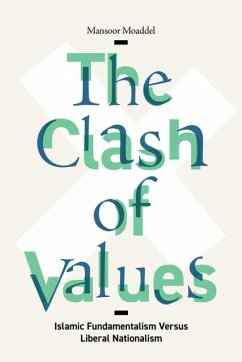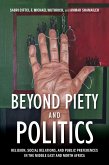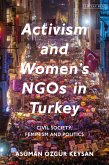Much of the Middle East and North Africa still appears to be in a transitional period set in motion by the 2011 Arab uprisings, and the political trajectory of the region remains difficult to grasp. In The Clash of Values, Mansoor Moaddel provides groundbreaking empirical data to demonstrate how the collision between Islamic fundamentalism and liberal nationalism explains the region's present and will determine its future.
Analyzing data from over 60,000 face-to-face interviews of nationally representative samples of people in seven countries-Egypt, Iraq, Lebanon, Pakistan, Saudi Arabia, Tunisia, and Turkey-Moaddel reveals the depth and breadth of the conflict of values. He develops measures of expressive individualism, gender equality, secularism, and religious fundamentalism and shows that the factors that strengthen liberal values also weaken fundamentalism. Moaddel highlights longitudinal data showing changes in orientations toward secular politics, Western-type government, religious tolerance, national identity, and to a limited extent gender equality, as well as a significant decline in support for political Islam, over the past decade. Focusing on these trends, he contends that the Arab Spring represents a new phase of collective action rooted in the spread of the belief in individual liberty. Offering a rigorous and deeply researched perspective on social change, The Clash of Values disentangles the Middle East and North Africa's political complexity and pinpoints a crucial trend toward liberal nationalism.
Analyzing data from over 60,000 face-to-face interviews of nationally representative samples of people in seven countries-Egypt, Iraq, Lebanon, Pakistan, Saudi Arabia, Tunisia, and Turkey-Moaddel reveals the depth and breadth of the conflict of values. He develops measures of expressive individualism, gender equality, secularism, and religious fundamentalism and shows that the factors that strengthen liberal values also weaken fundamentalism. Moaddel highlights longitudinal data showing changes in orientations toward secular politics, Western-type government, religious tolerance, national identity, and to a limited extent gender equality, as well as a significant decline in support for political Islam, over the past decade. Focusing on these trends, he contends that the Arab Spring represents a new phase of collective action rooted in the spread of the belief in individual liberty. Offering a rigorous and deeply researched perspective on social change, The Clash of Values disentangles the Middle East and North Africa's political complexity and pinpoints a crucial trend toward liberal nationalism.
Dieser Download kann aus rechtlichen Gründen nur mit Rechnungsadresse in A, D ausgeliefert werden.









